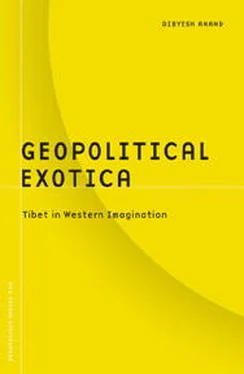[34]Missionaries had their own romantic vision of Tibet, often emphasizing the darker aspects of Tibetan culture in order to highlight the country's need for Christian enlightenment. Petrus and Susie Rijnhart expressed the goal of their missionary travel as "perpetuating and deepening the widespread interest in the evangelization of Tibet" for "much has [been] written of the heathen in other countries… but the Tibetans with their monstrous butter Buddha occupy a unique place in the world's idolatry" (1901, 1, 119). After all, Lhasa is not "only a city of metaphysical mysteries and the mummery of idol-worship; it is a secret chamber of crime; its rock and its road, its silken flags and its scented altars, are all stained with blood" (Carey 1902, 58). Monastic rapacity and domination along with criticisms of Tibetan sexual morality were common themes in missionary writings. Missionaries saw themselves as "soldiers of Christ" and Tibet as a citadel under siege (Bray 2001, 28). However, by the late twentieth century, missionary accounts show much greater empathy and sometimes a deep cultural understanding.
[35]Though Tibet is mainly associated with a variant of Buddhism or "Lamaism," there were quite a few practicing Muslims living in Lhasa. In most of the studies on Tibetan culture, the contribution of Tibetan Muslims is largely ignored. For exceptions, see Sheikh 1991; Siddiqui 1991; Tibet Journal 1995.
[36]Waddell even purchased a "Lamaist temple with its fittings; and prevailed on the officiating priests to explain… in full detail the symbolism and the rites as they proceeded" (1972, viii).
[37]Yet the lama is not totally convinced about British control over knowledge, for he says that there are still things that Western scholars do not know, have not sought-things relating to spiritual wisdom. Later, the lama introduces Kim to new art forms and says, chuckling, "The Sahibs have not all this world's wisdom" (Kipling 1976, 209; emphasis in original).
[38]Wilson surmises why Kipling used the character of a Tibetan lama and not any other Indian religious figure: it was essential to the spiritual relation that was to develop between the lama and Kim that, for Kim, his master be an exotic novelty, for the boy's curiosity about everything new is what marks him out as someone who is likely to learn from life (Wilson 1987, 53). The lama provides exactly this. His simplicity and novelty allowed Kim to claim that "the lama was his trove, and he proposed to take possession" (Kipling 1976, 19). And it was also necessary that the master should be entirely dependent upon Kim for guidance in the real world. The Tibetan lama symbolized radical "otherworldliness."
[39]Interestingly, Kipling had borrowed the term "Teshoo Lama" from earlier British accounts of the limited interaction with Tibetans at the end of the eighteenth century. George Bogle (see Markham 1876) as well as Samuel Turner (Turner 1971/1800), representatives of the East India Company, had both interacted with Tashi Lama/Teshoo Lama (later known as Panchen Lama).
[40]Naturalization is another theme that operates within Western representational practices, as "natives" are often associated with nature. Here, nature is opposed to culture and civilization: primitive people live in a state of nature and, similarly, those who live close to nature are primitive, uncivilized. Riencourt contends that the "psychic knowledge of the lamas" is caused by the "awe-inspiring landscape, severity of the climate and remoteness of its valleys, the majestic silence and peace of the roof of the world" (1950, 263).
[41]For a critical take on David-Neel's travel writing, see Mills 1991. See also Foster and Foster 1987.
[42]A secret memorandum dated 22 August 1922 mentions her as a "lady of somewhat doubtful antecedents" (IOR: L/P&S/10/1012 1921, 145).
[43]Lopez, for example, praises Rampa's books as having "brought the plight of Tibet to an otherwise indifferent audience of hundreds of thousands of Westerners, who would remain unconcerned were it not for the trappings of astral travel, spiritualism, and the hope of human evolution to a new age" (1998, 107).
[44]Fascination with gold has been a part of Western imagination of Tibet since ancient times when the Greeks wrote of gold-digging ants. In the early twentieth century, the British Foreign Office reports: "Even though gold is not produced much in early 20th century, it has little bearing over future possibilities" and approvingly quotes Holdich: 'Tibet is not only rich [in gold] in the ordinary acceptance of the term; she must be enormously rich-possibly richer than any country in the world. For thousands of years gold has been washed out of her surface soil by the very crudest of all processes… From every river which has its source in the Tibetan plateau, gold is washed" (1920, 61).
[45]Tibet as a mere playground for Westerners' adventure is more clearly visible in Davidson's The Rose of Tibet (1995), originally published in 1962. Its most defining feature is an abundance of sexual motifs. Here we come across priestesses who are not allowed to have sex, but they still do it "like rattlesnakes," often with outsiders, as there are only a hundred monks to "take care" of them (336). We encounter the she-devil who was "not old, and she was not cold; and she was far from being a virgin" (399); instead, she was "delicious and delectable and always unknowable" (407). And she possessed "green tears-emeralds"-half of which she later gives to the hero, an Englishman, Charles Houston, as a sign of her love. Houston not only has sex with her but also insists on her being monogamous. He fails in this as she indulges in the "particularly, vilely horrible" custom of having sex with the main abbot. He now saw her as an object lovely but diseased, a rank thing growing unhealthily on top of a dunghill (441).
[46]For a comprehensive collection of different perspectives on the Tibet question, see Sautman and Dreyer 2006.
[47]Focusing on the constructedness of Tibet does not mean that China or any other geopolitical entity is less constructed. For a contested notion of "China," see Gladney 2004; Liu 2004; Shih 2003.
[48]The reasoning of Bogle, an East India Company official in the 1770s, for the need to establish commercial relations with Tibet (and other states in the cis-Himalayan region) reflects the expansionary imperative within the colonizing regime of the East India Company. He says, "The constant drain of money from these provinces [in the Gangetic plains] is a consequence naturally arising from the relative situation in which this country is placed with respect to Great Britain… It is impossible to prevent this drain-all that can be done, is to endeavor to supply it by opening new channels of commerce" (IOR: H/219 1768-84, 375).
[49]As Shaumian points out, "Russian authorities never contemplated direct military intervention in Tibet, nor did they nurture plans to conquer India, but skilfully and often successfully exploited the Tibetan question to exert pressure on Great Britain and thereby obtain concessions in other regions that were more germane to their military-strategic and other political interests" (2000, viii).
[50]Curzon's fear of Russia in the Great Game was now seen as unimportant in comparison to the bigger game being played in Europe with shifting alliances. "Tibet was a pawn to be manipulated according to the requirements of big power politics. The Game, a strategic one rather than a tactical one, was suddenly being played in the chanceries of Europe, not in the deserts of trans-Himalaya" (MacGregor 1970, 351).
[51]A protest by an unknown bureaucrat is prescient: "To omit the line is of course the line of least resistance; but it leaves an ambiguity just when we were striving for precision-and a dangerous ambiguity of wh. the Chinese will continue to avail themselves" (IOR: L/P&S/10/265 1912, 47).
Читать дальше












